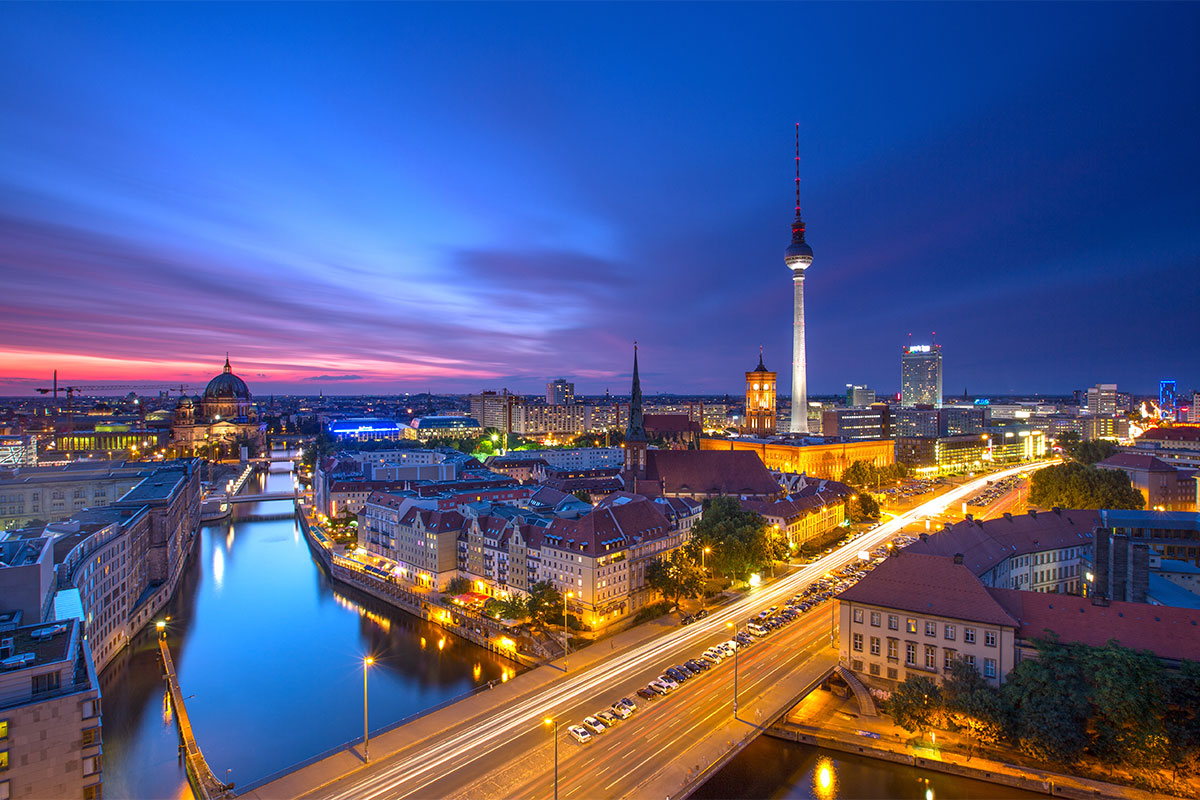Stefan Verlohren, MD, PhD
Charité – Universitätsmedizin Berlin
Stefan.verlohren@charite.de
The European Congress of the International Society for the Hypertension in Pregnancy took place from 6th to 9th September in Berlin Germany.The European meeting takes place biannualy between the world congresses of the ISSHP. With 344 participants from 42 Countries including the USA, Australia, Hong Kong, Brazil, India and many more it was not an European but truly an international congress.
 The Congress Chairs Stefan Verlohren (Berlin Germany), Dietmar Schlembach, (Berlin Germany), Holger Stepan (Leipzig, Germany) and Ralf Dechend (Berlin Germany) had created an ambitious program. The main congress days Thursday, Friday and Saturday were opened up with plenary sessions. The venue for the plenaries were the Auditorium of the “Langenbeck Virchow Haus”, a historical building located at the Campus of the Charité (Picture 1). Afterwards, three parallel sessions ran through the day. The topics of these parallel sessions were oriented at the greater areas of clinical research, clinical management and basic research in the field of preeclampsia. The sessions were constructed as such that the theme of the session was introduced by two keynote presentations from invited speakers then followed by oral presentations chosen from the best submitted abstracts. In the later afternoon another plenary session (Thursday) as well as the poster session (Friday) rounded up the program. This led to three intense congress days full of scientific input and discussions.
The Congress Chairs Stefan Verlohren (Berlin Germany), Dietmar Schlembach, (Berlin Germany), Holger Stepan (Leipzig, Germany) and Ralf Dechend (Berlin Germany) had created an ambitious program. The main congress days Thursday, Friday and Saturday were opened up with plenary sessions. The venue for the plenaries were the Auditorium of the “Langenbeck Virchow Haus”, a historical building located at the Campus of the Charité (Picture 1). Afterwards, three parallel sessions ran through the day. The topics of these parallel sessions were oriented at the greater areas of clinical research, clinical management and basic research in the field of preeclampsia. The sessions were constructed as such that the theme of the session was introduced by two keynote presentations from invited speakers then followed by oral presentations chosen from the best submitted abstracts. In the later afternoon another plenary session (Thursday) as well as the poster session (Friday) rounded up the program. This led to three intense congress days full of scientific input and discussions.
In the opening plenary on Wednesday, Wolfgang Henrich, chair of the Department of Obstetrics at the Charité – Universitätsmedizin Berlin gave a historical overview of 300 years of Obstetrics at the Charité. Friedrich Luft, emeritus chair of the Department of Nephrology of 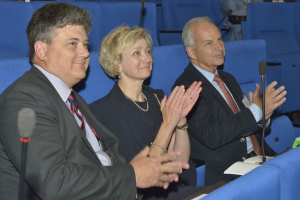 the Charité Campus Buch remembered 40 years of preeclampsia research that he actively accompanied. Marc Brown (Sydney, Australia), the president and Laura McGee (London, UK) the incoming president, gave resumé and outlook of the passed and coming years of their respective presidency (Picture 2). In the center of Marc Browns talk were the achievements of the ISSHP action plan. Laura McGee reported about the status of the upcoming publication of the revision of the ISSHP preeclampsia guidelines.
the Charité Campus Buch remembered 40 years of preeclampsia research that he actively accompanied. Marc Brown (Sydney, Australia), the president and Laura McGee (London, UK) the incoming president, gave resumé and outlook of the passed and coming years of their respective presidency (Picture 2). In the center of Marc Browns talk were the achievements of the ISSHP action plan. Laura McGee reported about the status of the upcoming publication of the revision of the ISSHP preeclampsia guidelines.
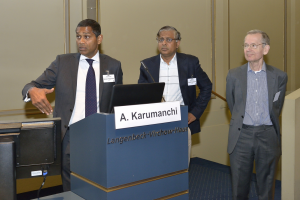 One of the scientific highlights of the meeting was the debate about the etiology of preeclampsia. Basky Thiganathan (London, UK) was putting forth the notion that preeclampsia is actually a maternal cardiovascular disorder (Pictures 3, 4). In his argumentation most features of the disease that are normally attributed to be results of a dysfunctional placenta can be explained by the maternal heart not meeting the demands of pregnancy. Contrary to this Christopher Redman (Oxford, UK) elegantly emphasized the placental origins of the disease. He showed how the different steps from pre-implantation to full disease can be explained by placental pathology, with immunologic miscommunication between decidua and fetal allograft playing a central role Ananth Karumanchi (Boston, USA) as the third discussant highlighted the role of an altered placental expression of angiogenic and anti-angiogenic factors in being a pacemaker of the disease. This academic battle was a fruitful interaction of three leaders in the respective field. Although no new data were presented in this merely philosophical exchange it nevertheless sparked understanding and ways to follow in research in the origins of preeclampsia. Liona Poon (Hong Kong) gave a detailed lecture on the recently published ASPRE study and dissecting its implications for the first trimester screening for preeclampsia. Ravi Thadhani (Boston, USA) gave an update on the progress in finding a therapy for the disease with the way leading from an extracorporal removal of sFlt-1 to prolong preeclamptic pregnancy to a putative application of adding back PlGF. Annemarie Hennessy (Sydney, Australia) presented preliminary data on that, emphasizing the long way to clinical application from their results in the baboon model. Andrew Sharp (Liverpool, UK) showed results of the MAPPLE study shedding a controversial light on the use of PlGF for the informed management of preeclampsia and IUGR, possibly not reducing maternal and fetal adverse events but creating them. Francesc Figueras (Barcelona, Spain) gave an excellent overview
One of the scientific highlights of the meeting was the debate about the etiology of preeclampsia. Basky Thiganathan (London, UK) was putting forth the notion that preeclampsia is actually a maternal cardiovascular disorder (Pictures 3, 4). In his argumentation most features of the disease that are normally attributed to be results of a dysfunctional placenta can be explained by the maternal heart not meeting the demands of pregnancy. Contrary to this Christopher Redman (Oxford, UK) elegantly emphasized the placental origins of the disease. He showed how the different steps from pre-implantation to full disease can be explained by placental pathology, with immunologic miscommunication between decidua and fetal allograft playing a central role Ananth Karumanchi (Boston, USA) as the third discussant highlighted the role of an altered placental expression of angiogenic and anti-angiogenic factors in being a pacemaker of the disease. This academic battle was a fruitful interaction of three leaders in the respective field. Although no new data were presented in this merely philosophical exchange it nevertheless sparked understanding and ways to follow in research in the origins of preeclampsia. Liona Poon (Hong Kong) gave a detailed lecture on the recently published ASPRE study and dissecting its implications for the first trimester screening for preeclampsia. Ravi Thadhani (Boston, USA) gave an update on the progress in finding a therapy for the disease with the way leading from an extracorporal removal of sFlt-1 to prolong preeclamptic pregnancy to a putative application of adding back PlGF. Annemarie Hennessy (Sydney, Australia) presented preliminary data on that, emphasizing the long way to clinical application from their results in the baboon model. Andrew Sharp (Liverpool, UK) showed results of the MAPPLE study shedding a controversial light on the use of PlGF for the informed management of preeclampsia and IUGR, possibly not reducing maternal and fetal adverse events but creating them. Francesc Figueras (Barcelona, Spain) gave an excellent overview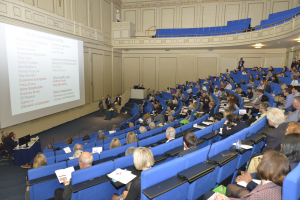 on the difficulties of an precise diagnosis of intrauterine growth restriction and challenges in management following diagnosis. The Immunology of preeclampsia was discussed in a dedicated session where Jens Kieckebusch (Cambridge, UK), Andrew Sharky (Cambridge, UK) and Michaela Golic (Berlin, Germany) discussed the role of uterine NK cells and presented their results from humans, mice and rats respectively. These were just a few scientific highlights from a qualitatively excellent program. All invited speakers as well as the oral presentation met the highest standards. The session chairs kept the time meticulously and spared discussions. Likewise, the poster sessions were actively followed and opened up room for vivid discussions (Pictures 5, 6, 7).
on the difficulties of an precise diagnosis of intrauterine growth restriction and challenges in management following diagnosis. The Immunology of preeclampsia was discussed in a dedicated session where Jens Kieckebusch (Cambridge, UK), Andrew Sharky (Cambridge, UK) and Michaela Golic (Berlin, Germany) discussed the role of uterine NK cells and presented their results from humans, mice and rats respectively. These were just a few scientific highlights from a qualitatively excellent program. All invited speakers as well as the oral presentation met the highest standards. The session chairs kept the time meticulously and spared discussions. Likewise, the poster sessions were actively followed and opened up room for vivid discussions (Pictures 5, 6, 7).

The intensity of the scientific interaction was balanced with a well acclaimed congress party. It took place in the “Ballhaus Berlin”, a typical Berlin ballroom conserved in the style of Berlins roaring 20s. Stefan Verlohren presented a quiz with trivia on the ISSHP, preeclampsia and Berlin. The quiz employed the unique feature of the location: the historical but working table telephones. People knowing the right answer to the questions could call the quizmasters table. This created a happy fuzz and in the end a winning table received typical Berlin “Pfeffis” (peppermint breathmints). After dinner, a DJ team filled the dancefloor. A photo machine with costumes animated to crazy group pictures. The invited faculty enjoyed a dinner in the renowed restaurant “Käfer” in top of the German Parliament Building, the “Reichstag” and had a chance to get an exclusive view of the city from above (Pictures 8, 9).

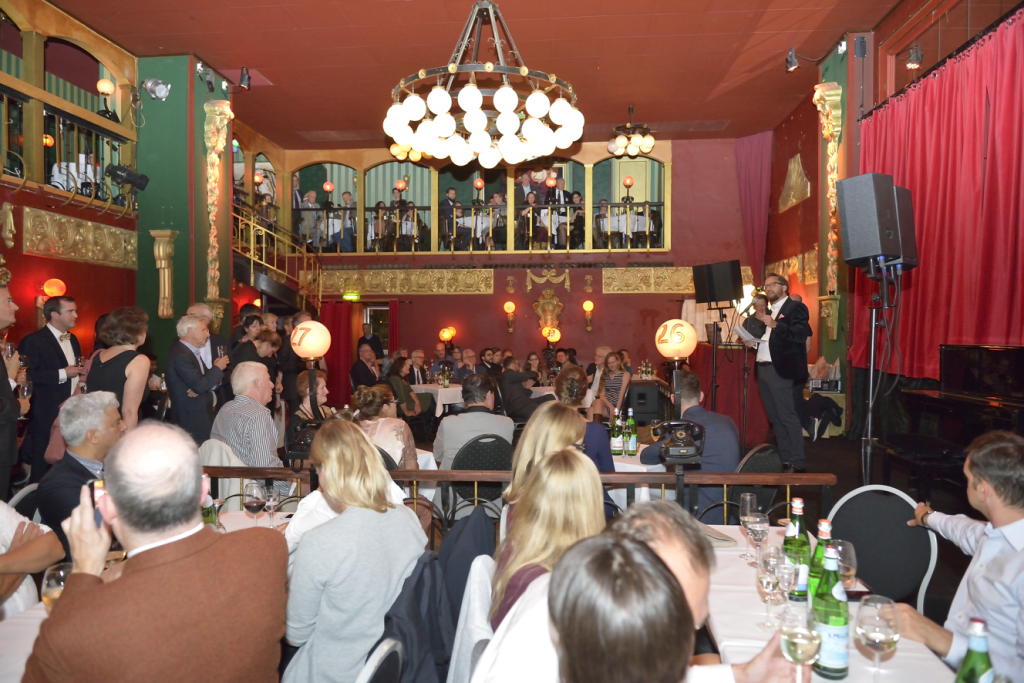
In the closing ceremony, three poster and oral presentation awards were presented, granted by ISSHP, the German Preeclampsia Group and the Scientific excellence award of the Congress. The winners of the oral presentation awards were Alexandra Gellhaus (Essen, Germany), Andrew Sharp (Liverpool, GB) and Stephanie Worton (Manchester, GB). The winners of the poster prizes were Edouard Lecarpentier (Paris, France), Crystal West (Washington, USA) and Frederikke Lihme (Copenhagen, Denmark). In the executive board meeting, the presidency was handed over from Mark Brown to Laura McGee. This was again appraised by Louise Kenny (Cork, Ireland) followed by a speech of Laura McGee who is now president of the ISSHP who gave also an outlook to the coming meetings. She emphasized that the following international and European meeting will have a “hard time” to meet the standards set so high by the Berlin meeting. The challenge was readily accepted as various bids were put forth for the next European ISSHP congress. Finally, Marijke Faas (Amsterdam, Netherlands) presented a short movie on the location of the next ISSHP world congress and inviting everybody to participate to creating an equally exciting meeting in Amsterdam 2018.
The congress organizers would like to thank again all participants. Without the active contribution, the success of the meeting would not be possible. The excellent feedback that was received should be given back to all clinicians and researchers that made their way to Berlin. Also the industry must be acknowledged for their support of the conference. The organizational agency Conventus did an excellent job in assuring a smooth delivery. And finally the ISSHP is the society that brought us together – the chairs would like to thank for their support.
Stefan Verlohren on behalf of the Congress Chairs

